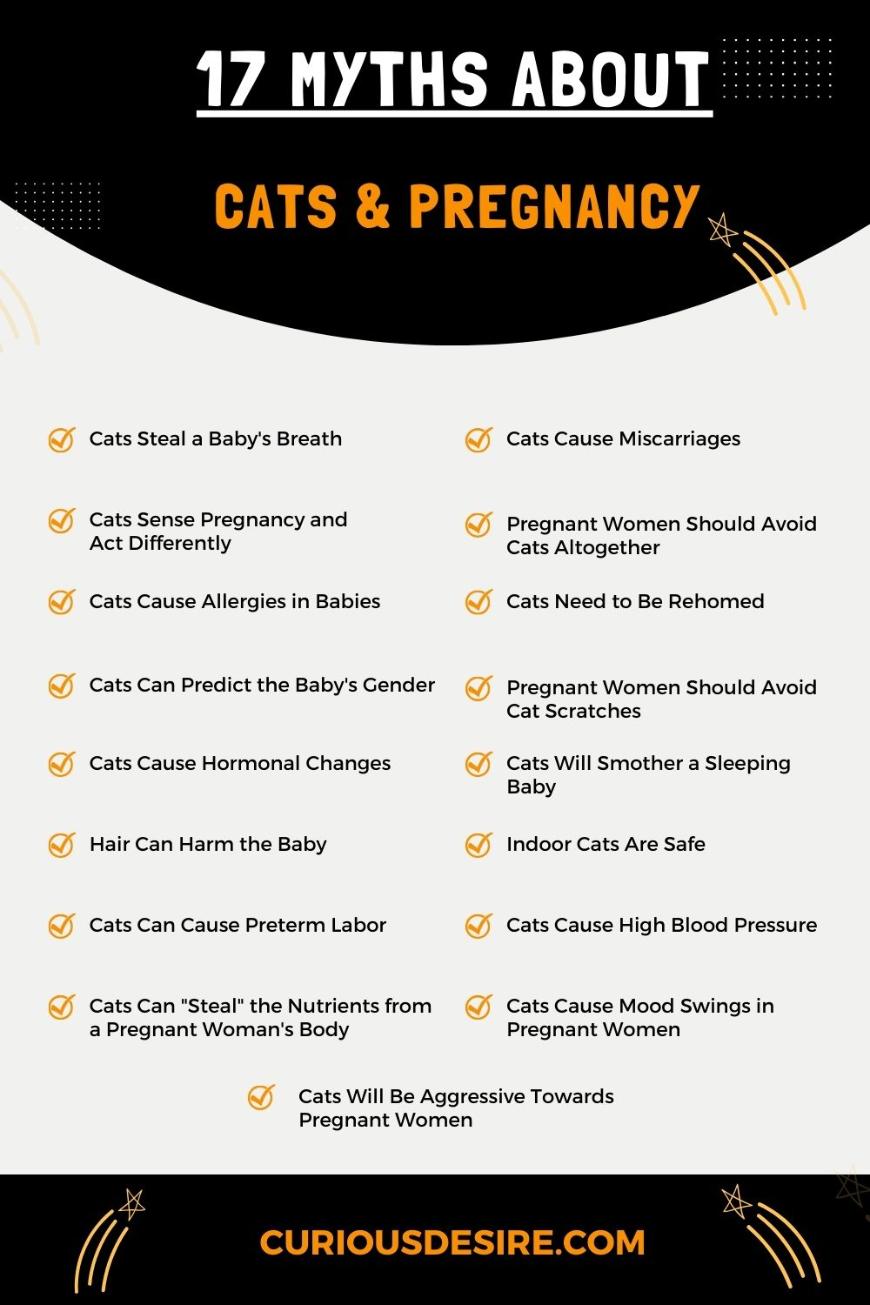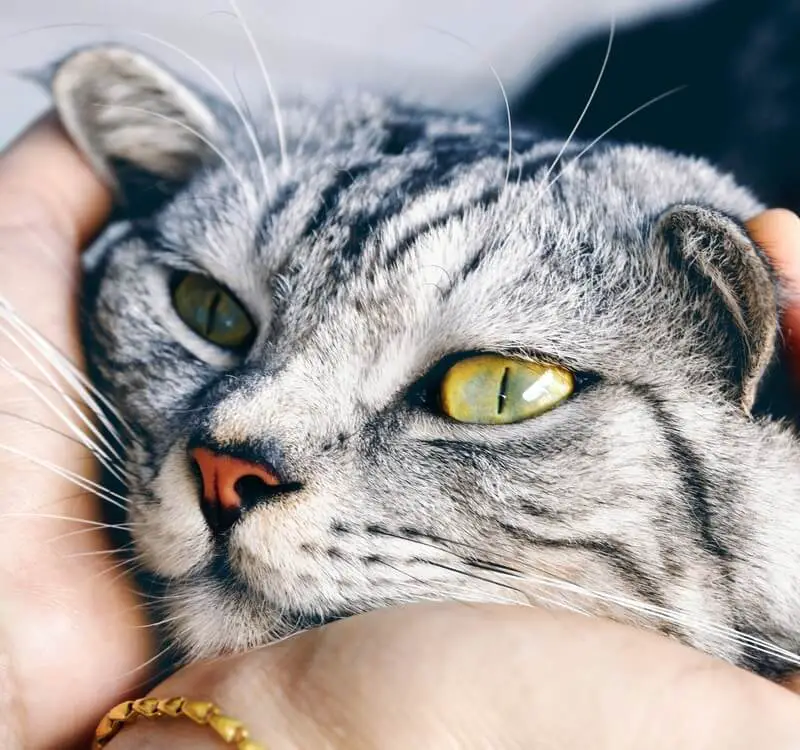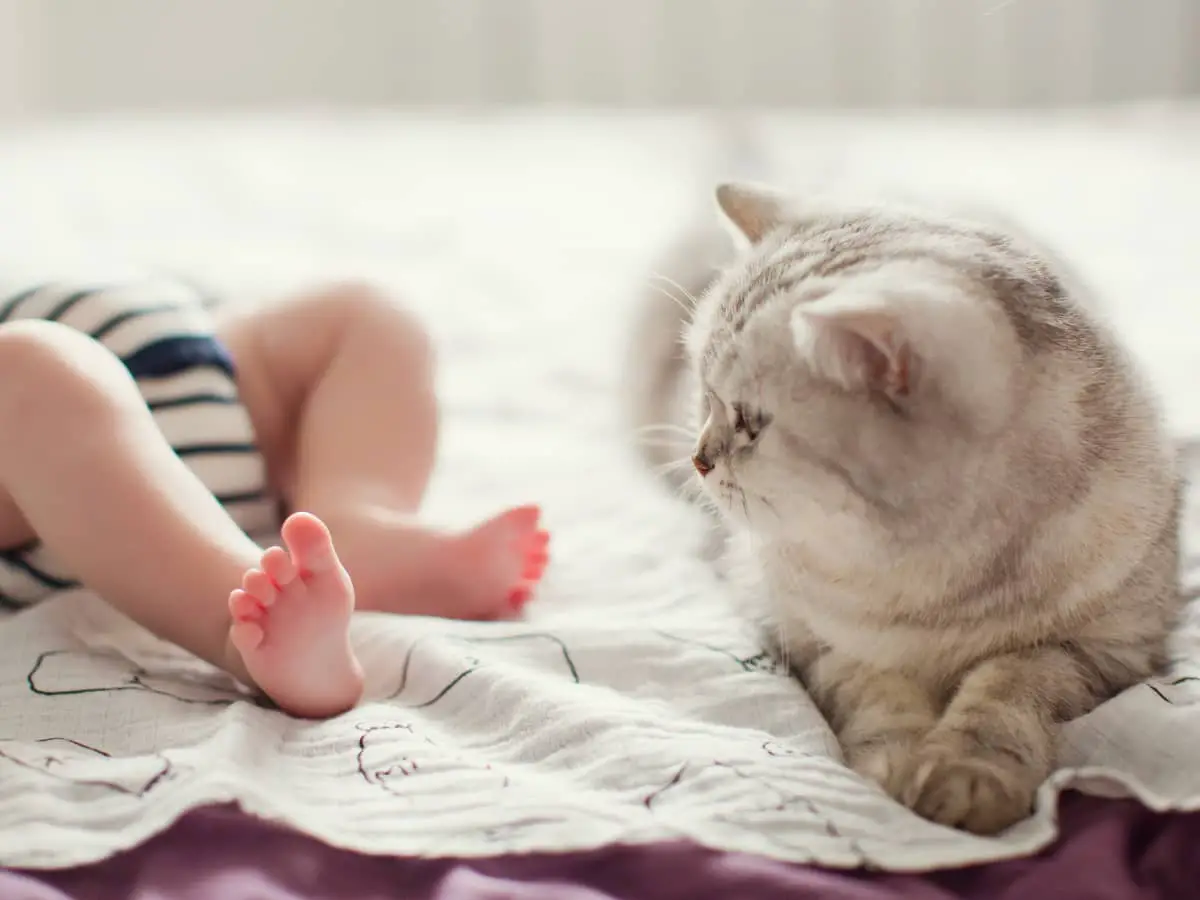Bringing a new life into the world is an exciting journey, yet it often brings up numerous questions and worries, particularly for expectant mothers.
Among the various topics that might raise eyebrows, the relationship between cats and pregnancy tends to be a source of confusion.
In this article, we aim to uncover some of the myths about pregnancy, offering clarity and peace of mind for all the moms-to-be who share their homes with these furry friends.
Here are the 5 most common myths about cats and pregnancy:
- Cats Steal a Baby’s Breath
- Cats Cause Allergies in Babies
Cats Can Predict the Baby’s Gender - Cats Cause Miscarriages
- Cats Cause High Blood Pressure in Pregnant Women
[toc]

Myth 1: Cats Steal a Baby’s Breath
Why Does This Myth Exist?
The belief that cats steal a baby’s breath probably came from old superstitions and stories. Cats have always had a mysterious nature, making them part of lots of myths and tales in history.
The thought that a cat could hurt a baby might have been because people didn’t understand Sudden Infant Death Syndrome (SIDS) and how babies can die sometimes during sleep without a clear reason.
Debunking the Myth:
The notion that cats can steal a baby’s breath is entirely false. Cats do not have any interest in harming infants, and there is no scientific basis for such a claim.
Sudden infant death syndrome (SIDS) has known risk factors, but cats are not one of them.
In reality, providing a safe sleeping environment for a baby is crucial for reducing the risk of SIDS.
It’s important to rely on evidence-based information and dispel unfounded fears to ensure a safe and healthy environment for both babies and pets.
Myth 2: Miscarriages Caused by Cats
Why Does This Myth Exist?
The myth that cats can cause miscarriages may have arisen due to misconceptions about the parasite Toxoplasma gondii.
Cats can be carriers of this parasite, and its transmission to humans is a concern, especially for pregnant women.
However, the misinformation likely stems from a lack of understanding about how the transmission occurs and the measures that can be taken to prevent it.
Debunking the Myth:
Properly cared-for cats pose no direct threat to pregnancy. The main worry about cats and pregnancy is a parasitic infection called toxoplasmosis, caused by Toxoplasma Gondii.
Toxoplasmosis is typically contracted through ingestion of contaminated food or water, not by simply being in proximity to a cat.
Pregnant women can safely live with cats by practicing good hygiene, such as avoiding handling cat litter or wearing gloves if necessary.
Myth 3: Pregnancy Makes Cats Act Differently
Why Does This Myth Exist?
The idea that cats can tell if someone’s pregnant and act differently might come from people’s personal observations and how we tend to think animals are a lot like us.
This makes some folks think that the cat knows about the pregnancy in a special way.
Debunking the Myth:
While cats are observant animals and can pick up on changes in their environment, there is no scientific evidence to support the claim that they can detect pregnancy in humans.
Cats may react to any change in their owner’s routine, mood, or scent, but these reactions are not indicative of an ability to sense pregnancy specifically.
Pregnant women can continue to interact with their cats as usual, ensuring that they maintain a loving and consistent relationship while dispelling the notion that cats have a supernatural ability to detect pregnancy.

Myth 4: Pregnant Women Should Avoid Cats Altogether
Why Does This Myth Exist?
Debunking the Myth:
Pregnant women can safely coexist with cats by following proper hygiene practices. The key is to minimize the risk of toxoplasmosis transmission, which primarily occurs through contact with cat feces.
Regular veterinary care, a well-maintained living environment, and proper hand hygiene eliminate the need to avoid cats altogether.
Knowing the exact risks and taking the right steps helps pregnant women and their cat buddies have a happy and healthy time together.
Myth 5: Cats Cause Allergies in Babies
Why Does This Myth Exist?
The perception that having a cat around during pregnancy might increase the baby’s chances of developing allergies could come from not fully grasping the hygiene hypothesis.
Debunking the Myth:
The hygiene hypothesis suggests that a bit of exposure to germs is good for our immune system’s growth.
Surprisingly, having a cat around during pregnancy and early childhood might not actually up the risk of allergies.
It’s all about finding balance. Keeping a tidy home and being responsible with pet care can keep both kids and pets healthy.
This approach supports a well-rounded environment that might help the immune system develop in a healthier way.
Cats And Pregnancy Myths FAQs
What do cats do when they sense you’re pregnant?
Cats may exhibit various behaviors when they sense pregnancy, including increased affection, seeking more attention, or even being more protective.
However, individual cat reactions can vary.
Does having a cat affect pregnancy?
In general, owning a cat does not adversely affect pregnancy.
However, pregnant women should take precautions to avoid exposure to cat feces, specifically from outdoor cats, as it may carry a parasite called Toxoplasma gondii that can be harmful to the unborn child.
Can cats hear a baby in the womb?
While cats have acute hearing, it is unlikely that they can hear a baby in the womb. Human sounds, including the baby’s heartbeat, are muffled by the mother’s body and the amniotic fluid.
How soon can cats sense pregnancy?
Cats may start exhibiting changes in behavior shortly after a woman becomes pregnant.
Some owners report changes within a few weeks, but the timing can vary.
Why do cats attack pregnant women?
It’s uncommon for cats to intentionally attack pregnant women. Aggressive behavior could be due to various reasons, such as stress, fear, or discomfort.
If a cat displays aggression, it’s essential to consult with a veterinarian to understand and address the underlying cause.
Can male cats sense pregnancy?
There’s no conclusive scientific evidence that suggests male cats can specifically sense human pregnancy. However, they may react to changes in the household and the pregnant woman’s behavior.
